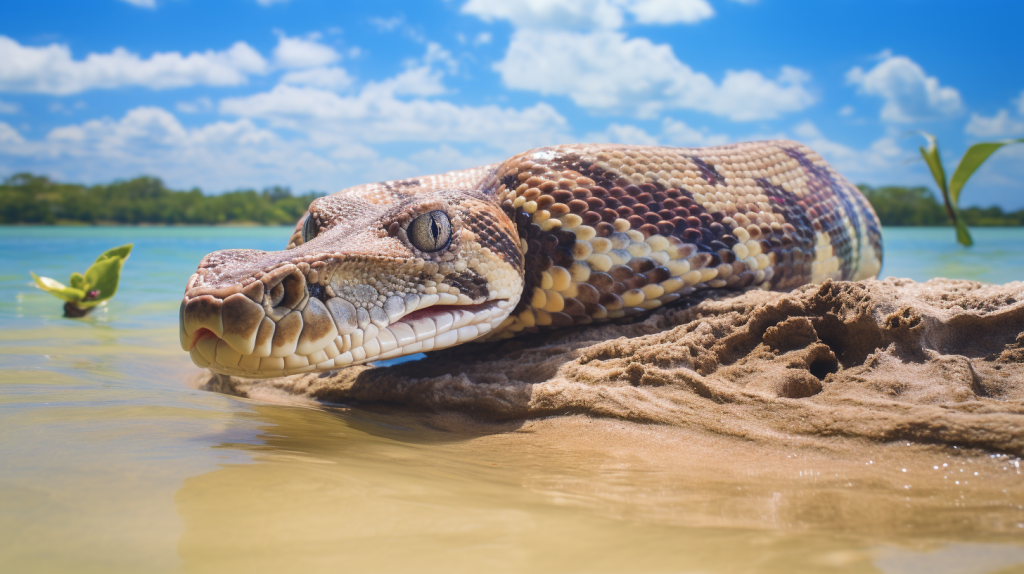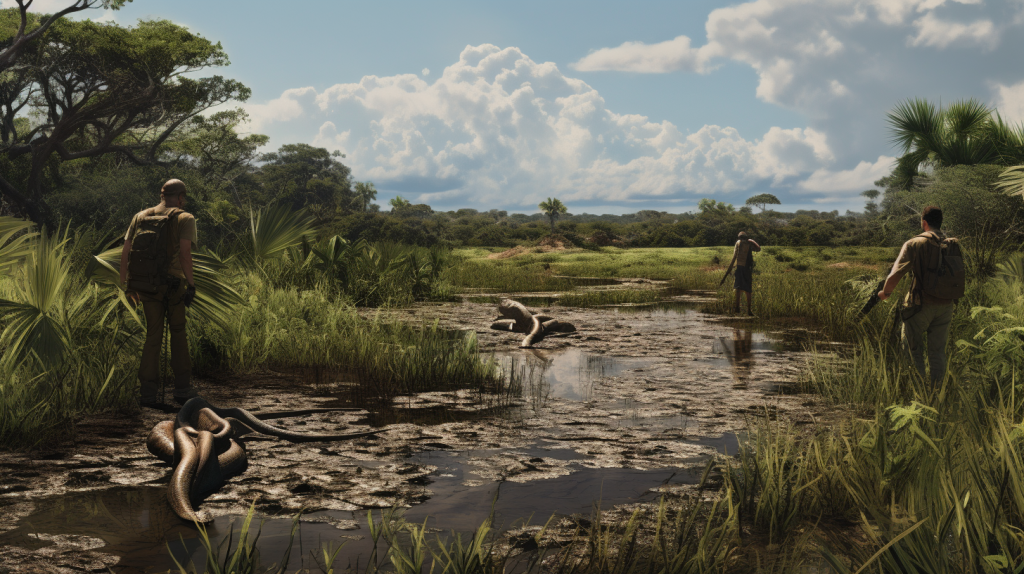When it comes to the unique challenges posed by invasive species, Florida python hunting regulations stands as a testament to the states prompt approach to bring solutions. Amidst the picturesque landscapes and diverse ecosystems, one particular intruder has captured both curiosity and concern – the Burmese python.
As these non-native snakes flourish, Florida Python Hunting Regulations emerge as a vital framework to address the issue. Let’s embark on a journey through the intricacies of these regulations, diving into questions that unravel the mystique surrounding python hunting in the Sunshine State.
Florida Python Hunting Regulations
Navigating a Delicate Balance
Imagine immersing yourself in the unspoiled landscapes of Florida’s wilderness – a dynamic tapestry interwoven with swamps, forests, and wetlands. In this mosaic of ecosystems, the Burmese python, an uninvited guest, has managed to carve an unexpected niche.
Amidst the ebb and flow of nature’s rhythms, the emergence of Florida Python Hunting Regulations adds a burst of significance to the ongoing narrative. These regulations, like threads woven into the fabric of conservation, spotlight the urgency of addressing the far-reaching ecological impact that these serpents wield.
Bursting forth as a direct response to the ecological challenge posed by invasive pythons, these regulations stand as a testament to the delicate equilibrium that must be struck between the preservation of the environment and the imperative of human intervention.
As nature’s tapestry evolves, these regulations become a roadmap for navigating the intricate maze of environmental stewardship while managing the impact of invasive species.
Can You Hunt Pythons in Florida with a Gun?
The Tools of the Hunt
Amidst the crescendo of efforts to manage python populations that have found an unexpected home in Florida, a whirlwind of inquiries emerges. Can you harness the power of firearms in the relentless pursuit of these elusive invaders? The resounding answer reverberates across the landscape – a definitive yes.
The arsenal available to python hunters extends beyond traditional methods, embracing the potency of firearms to amplify their efforts. Within the framework of responsible removal, these tools contribute to the intricate dance of conservation and intervention.
As the sun dips below the horizon, casting an amber hue on the wilderness, the crack of a gunshot becomes a burst of impact, echoing through the interconnected pathways of Florida’s ecosystems.
Like a symphony conductor wielding a baton, these firearms play a vital role in orchestrating a harmonious balance between the delicate intricacies of nature and the pressing need to manage the python’s encroachment.
Bursting forth with calculated precision, these tools serve as a reminder that addressing ecological challenges often requires embracing a spectrum of methodologies, each contributing its unique note to the symphony of conservation.
When Can Pythons Be Hunted in Florida?
Timing the Battle
Embarking on the path of a python hunter is akin to entering a world of both strategic precision and quiet patience. In this burst of calculated pursuit, the quest to manage python populations is guided by a crucial element – timing.
Bursting forth as a beacon of structure within the dynamic realm of wildlife management, the question that looms large is: when can pythons be hunted in Florida? The answer reveals a tapestry woven with foresight and environmental consideration.
Florida Python Hunting Regulations chart a course through the calendar, designating specific seasons that signal the opening of the python-hunting window. Bursting into action during these meticulously chosen timeframes, python hunters seize the opportunity to engage in their vital role as stewards of Florida’s ecosystems.
This burst of purposeful activity is not only a testament to the synergy between human intervention and environmental preservation but also a declaration of commitment to the delicate equilibrium that underscores Florida’s diverse and interconnected web of life.
As the seasons change and the sun paints the landscape with varying hues, the timing of these removal efforts adds yet another layer of complexity to the narrative of coexistence between humanity and nature.
Do Python Hunters in Florida Kill the Snakes?
A Moral Dilemma
Within the whirlwind of debates and discussions surrounding python hunting in Florida, a poignant question emerges from the midst – do python hunters simply kill the snakes they capture? The answer to this question, much like the mosaic of Florida’s ecosystems, is layered and complex.
In the burst of this intricate narrative, python hunters navigate a path that is driven by more than just the instinct to eliminate. Bursting with a profound sense of responsibility, these hunters tread the fine line between intervention and respect for life.
While the ultimate goal is to remove these invasive pythons from the delicate fabric of Florida’s environment, the approach goes beyond mere eradication. Bursting with a spirit of stewardship, ethical considerations dictate that the act of capturing is accompanied by a commitment to contribute to scientific research and a broader mission – one that revolves around understanding the intricate implications of these invasions and crafting strategies to mitigate their impact.
What Is the Best Caliber for Python Hunting?
Choosing the Right Weapon
In the realm of python hunting, the question of choosing the best caliber for firearms bursts forth with strategic significance. However, unlike a one-size-fits-all answer, the path to selecting the ideal caliber unfolds as a nuanced journey.There are a number of calibers that can work, from 45 to a 9mm to .410 shotgun, in many cases it depends on the situation.
Bursting onto this stage are a plethora of options, each offering a distinct blend of power and precision. The decision-making process is akin to assembling the pieces of a puzzle, where factors like personal preference, accuracy, and ethical considerations weave a complex tapestry.
Bursting through the considerations, python hunters navigate a landscape where the impact of their choices reaches beyond the trajectory of a bullet. The caliber chosen is a reflection of the hunter’s values – an amalgamation of the desire for effective removal and the aspiration for humane intervention.
Conclusion: Florida Python Hunting Regulations
Amidst the lush landscapes and captivating allure of Florida, the challenge of invasive pythons beckons a response. Florida Python Hunting Regulations offer a framework that navigates the complexities of preserving ecosystems while managing non-native species.
Bursting forth with urgency, these regulations empower hunters to engage in a meaningful battle that stretches beyond the physical hunt. As Florida Python Hunting Regulations echo across the wilderness, the purpose of human efforts resounds in a harmonious melody that seeks to restore equilibrium in the face of ecological challenges.
FAQs About Florida Python Hunting Regulations
Q: Are there specific regulations for python hunting in Florida?
A: Yes, Florida has established regulations for python hunting to address the issue of invasive Burmese pythons.
Q: Can hunters use firearms to hunt pythons in Florida?
A: Yes, firearms are allowed in python hunting as part of the toolkit to manage their population.
Q: When can pythons be hunted in Florida?
A: Python hunting in Florida is typically regulated by specific seasons to ensure responsible removal efforts.
Q: Do python hunters in Florida solely kill the snakes they capture?
A: While the primary goal is to remove invasive pythons, hunters often contribute to research efforts and ethical considerations.
Q: What factors influence the choice of caliber for python hunting?
A: Factors such as accuracy, effectiveness, and ethical considerations influence the choice of caliber for python hunting tools.
References:
- Florida Fish and Wildlife Conservation Commission. (2021). Python Permit Program. Retrieved from https://myfwc.com/wildlifehabitats/nonnatives/python/permit/
- Python Patrol. (2021). Regulations for Hunting Pythons in Florida. Retrieved from https://www.pythonpatrol.org/regulations-for-hunting-pythons-in-florida/





